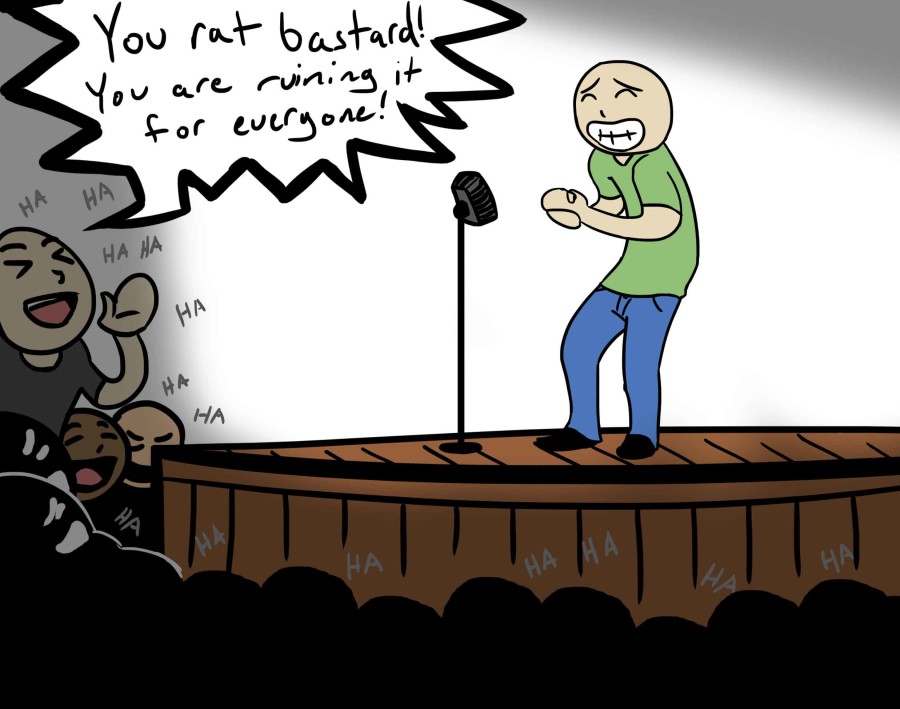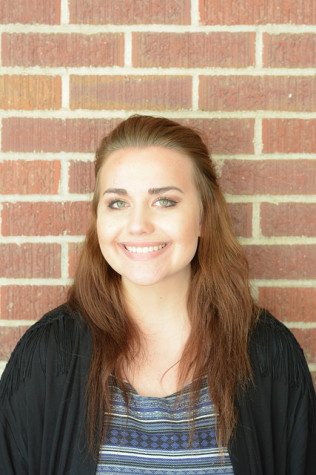Slam poetry rattles emotions
February 27, 2015
A hush settled over the crowd when the first poet dominated the stage at The Bartlett, a live music venue and bar, on Feb. 16 for the monthly Spokane Poetry Slam. A holler emanated from the back, followed by an inside joke that all the regulars seemed to know. Laughter rippled through the crowd.
The soft yet powerful voice booming from the back row and teasing the performer is EWU alumnus Kurt Olson’s, a performance poet himself and co-coordinator of Broken Mic, a weekly open mic poetry reading Wednesday nights at Neato Burrito.
Minutes into the show, the receptiveness and support from the audience for the poet already warmed the room. There was playful interaction and banter from attendees. If the performer strayed past the allocated three-minute time slot, people lightheartedly hollered in unison, “You rat bastard. You’re ruining it for everyone.” For every slam, there is a scorekeeper with a stopwatch who announces a time penalty when the emcee asks for the final score.
If the performer hesitated or lingered, unsure of their next line, the audience rubbed their hands together to show their support as if to say a resounding, “We are rooting for you.” According to Olson, this move is borrowed from the film “The Karate Kid” when Mr. Miyagi rubs his hands together to help his student, Daniel Laruso.
Finger snaps echoed throughout the room during each reading. Several people in the audience nodded their head when a verse resonated with them. Everyone conveyed their enthusiasm in a different way.
The judging system for the competition is subjective and arbitrary, but that is exactly the point. There is no real, set criteria to win. Five judges are chosen at random from the audience. They qualify as a judge if they have never attended a poetry slam before.
“Nothing else in the world gets judged like that,” said Olson. “It’s only meant to get people in. It’s a competition, so people get excited.”
Slam poetry is the art of performing poetry competitively, with poets emphasizing word usage and how they say it, therefore evoking a certain tone or emotion.
Among those present in the audience and performing included EWU alumnus Isaac Grambo, host and coordinator of Spoken Poetry Slam, and EWU alumnus Mark Anderson, co-coordinator of Broken Mic. Some would dub Grambo and Anderson as two of the several pioneers who helped expand the poetry scene in Spokane.
Gonzaga alumnus Devin Devine wrote poetry but did not consider performing until she was lured into attending Broken Mic with the promise of $1 grilled cheese and $1 beer specials and an invitation from a crush in her poetry class.
“I went for a guy the first couple times, and I really liked it,” said Devine. “Then he stopped going, which I liked more, and then I kept going.”
Devine became a regular attendee and, shortly after, an avid participant in the poetry scene, performing regularly at Broken Mic and The Spokane Poetry Slam.
“The nice thing about Broken Mic is that it’s the same people every week,” said Devine. “I can go there and perform a poem and it’s like having all your weird uncles and cousins together.”
According to Olson, when Broken Mic first started at Neato Burrito four years ago, it drew a crowd of eight or nine people and all were usually performers. It would last about 45 minutes maximum. Currently, there are around 20 readers a night and an average of about two or three new readers per week. Olson said that Neato Burrito’s seating capacity of around 78 people is often reached.
“It’s evolved big time,” said Olson. “It’s more than poetry. We’re sharing our lives.”
Grambo said there is a certain vulnerability that Spokane’s poetry scene has that distinguishes it from others cities almost to the point where Spokane possesses a certain kind of disdain for pretentious poetry. It is as if authenticity is the only scale by which the performer is judged.
“Often, people will write for scores. [Their] aim is to get the score than to communicate something the poet cares about,” said Grambo. “Whereas in Spokane, poets care more about writing what they’re feeling.”
It is common to see a self-deprecating and humble tone in the poetry performed.
“A lot of times, the poets are admitting that they are their own worst enemy, that they’ve made mistakes,” said Olson.
The Spokane crowd seems to not only hold an aversion to pretense, but also a radar for sensing it.
“What a Spokane audience wants is for you to tell the truth, because no matter how wonderful and beautiful your sob story might be, if it has a hint of bull crap, Spokane knows it,” said Olson.
Nonetheless, Grambo claimed that Spokane remains a safe place to practice poetry, especially for those who consider themselves rookies.
“People who are regulars are inclusive and welcoming to people who are new,” said Grambo.
In fact, an air of inclusivity and safety was Olson’s aim from the start. According to Olson, the poetry in Spokane transcends barriers such as income level, age, gender, sexuality and political ideology. It welcomes unity among a unique and diverse group of individuals through the art of expression. In this way, creativity works as a binding force in this community.
Olson said one can get a sense of what the city is struggling with just by listening to the poets. He compared it to receiving a sociological survey or sampling of what issues the citizens of Spokane face.
“It’s not just a platform for art’s sake or a just a platform for getting people away from their television sets,” said Olson. “It’s people stepping out of their comfort zone, not just to read, but to listen to other opinions and struggles.”









